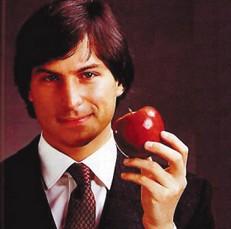CHAPTER TWENTY-FOUR
THE RESTORATION
回歸
The Loser Now Will Be Later to Win
此刻的失敗者終將勝利
Amelio calling up Wozniak as Jobs hangs back, 1997
Hovering Backstage
在幕后彷徨
“It’s rare that you see an artist in his thirties or forties able to really contribute something amazing,” Jobs declared as he was about to turn thirty.
“你很少能見(jiàn)到一個(gè)藝術(shù)家在三四十歲時(shí)還能有令人驚嘆的作品。”喬布斯即將30歲的時(shí)候這樣說(shuō)。
That held true for Jobs in his thirties, during the decade that began with his ouster from Apple in 1985. But after turning forty in 1995, he flourished. Toy Story was released that year, and the following year Apple’s purchase of NeXT offered him reentry into the company he had founded. In returning to Apple, Jobs would show that even people over forty could be great innovators. Having transformed personal computers in his twenties, he would now help to do the same for music players, the recording industry’s business model, mobile phones, apps, tablet computers, books, and journalism.
喬布斯30多歲的時(shí)候,自他1985年離開(kāi)蘋果后的10年間,確實(shí)少有建樹(shù)。但是當(dāng)他1995年步入40歲以后,卻成就卓著。那一年《玩具總動(dòng)員》發(fā)行上映,第二年蘋果收購(gòu)NeXT,使他一舉重返他當(dāng)年創(chuàng)建的公司。回到蘋果,喬布斯將證明,即使超過(guò)40歲的人也可以是最好的創(chuàng)新者。二十幾歲,他就改變了個(gè)人電腦,現(xiàn)在,他將同樣改變音樂(lè)播放器、唱片產(chǎn)業(yè)的商業(yè)模式、移動(dòng)電話、應(yīng)用軟件、平板電腦、書籍以及新聞業(yè)。
He had told Larry Ellison that his return strategy was to sell NeXT to Apple, get appointed to the board, and be there ready when CEO Gil Amelio stumbled. Ellison may have been baffled when Jobs insisted that he was not motivated by money, but it was partly true. He had neither Ellison’s conspicuous consumption needs nor Gates’s philanthropic impulses nor the competitive urge to see how high on the Forbes list he could get. Instead his ego needs and personal drives led him to seek fulfillment by creating a legacy that would awe people. A dual legacy, actually: building innovative products and building a lasting company. He wanted to be in the pantheon with, indeed a notch above, people like Edwin Land, Bill Hewlett, and David Packard. And the best way to achieve all this was to return to Apple and reclaim his kingdom.
他之前告訴拉里·埃利森,他的回歸策略是把NeXT賣給蘋果,借此進(jìn)入董事會(huì),然后在那兒等著阿梅里奧出錯(cuò)。當(dāng)喬布斯堅(jiān)持說(shuō)他的動(dòng)機(jī)不是錢時(shí),埃利森可能感到迷惑不解。但那的確部分屬實(shí)。他既沒(méi)有埃利森那種惹人注目的消費(fèi)需求,也沒(méi)有比爾·蓋茨那種投身慈善事業(yè)的內(nèi)在沖動(dòng),亦沒(méi)有那種想看看自己在《福布斯》排行榜上能爬多髙的競(jìng)爭(zhēng)意識(shí)。在他那自負(fù)和個(gè)人動(dòng)力的驅(qū)使下,他要通過(guò)創(chuàng)造足以令世人敬畏的傳奇來(lái)獲得滿足。這實(shí)際上包括兩個(gè)方面:制造不斷革新不斷變化的偉大產(chǎn)品,以及建立一家有持久生命力的公司。他希望跟埃德溫·蘭德、比爾·休利特和戴維·帕卡德這些人一起在萬(wàn)神殿占據(jù)一席之地,甚至比他們還要髙一級(jí)。要實(shí)現(xiàn)這些,最好的方式就是回到蘋果,奪回他的王朝。











